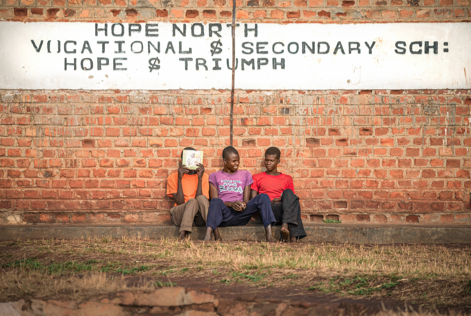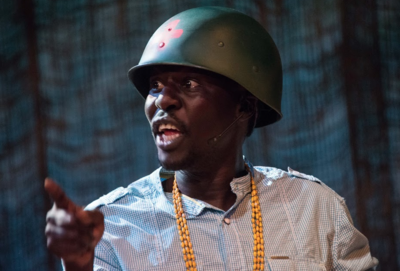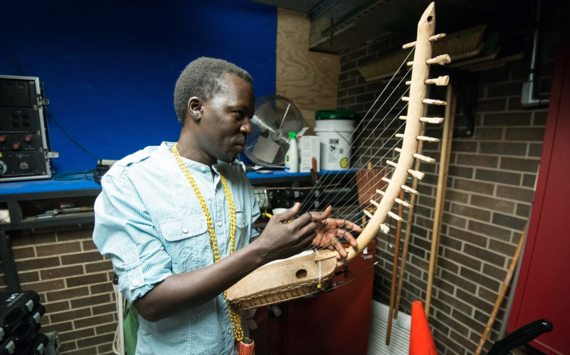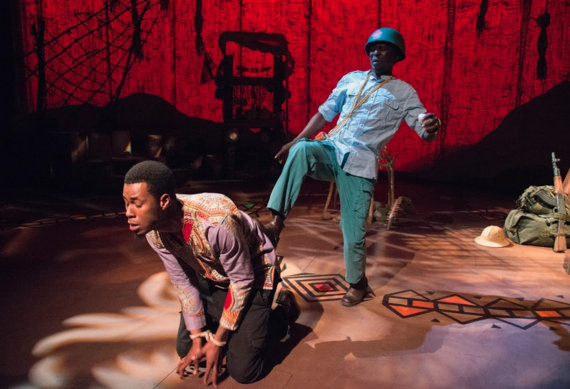A similar version of this story was published on the online theatrical journal HowlRound.
I was born in northern Uganda to the Acholi tribe on December 8, 1969, the third child in a family that included one father, three wives and twenty siblings. When I was 16, en route to school, a rebel army abducted me and, to make a dark story short, forced me to do terrible things against my will, and very much against my nature. I was lucky to escape with my life.
With northern Uganda in chaos, my family was not to be found. I made my way to the capital city Kampala, where an uncle I had never met was said to live. I found him living with two wives and four children in a two-room house in the slum known as Nguru. They found room for me, and offered a mat on the floor and I began to earn money to resume my education.
Culture is an important part of human development. Our values are embedded in our culture. So it's no wonder I found solace and healing through art. I practiced and studied the arts in high school, then college, ultimately earning a degree in performing arts. This started a career that has allowed me to see the world. Whenever I feel a darkness creep into my soul, I sing, dance and play music on the adungu, a traditional hand-held harp of northern Uganda. It always works, the darkness recedes. Art is my detox.
Ten years after my own bitter experience, just as my career started to take off, my younger brother Godfrey, a special person to me, was abducted and killed by Joseph Kony's infamous Lord's Resistance Army. He lived for some time in that evil army, the one known worldwide from "Kony 2012."
 My first response to Godfrey's abduction was to start Hope North, a safe haven and school for young victims of Uganda's civil war--a place where they can rebuild their lives and heal, as I healed, through education and creativity. This creativity is part of the core curriculum at Hope North, an accredited secondary. Arts education preserves our Acholi culture. Culture is an important part of human development. It is as important as food, water, shelter and academics--it cannot be ignored. Our values are embedded in our culture.
My first response to Godfrey's abduction was to start Hope North, a safe haven and school for young victims of Uganda's civil war--a place where they can rebuild their lives and heal, as I healed, through education and creativity. This creativity is part of the core curriculum at Hope North, an accredited secondary. Arts education preserves our Acholi culture. Culture is an important part of human development. It is as important as food, water, shelter and academics--it cannot be ignored. Our values are embedded in our culture.
Kony and the warlords that preceded him decimated traditional Acholi ways; his stated purpose was to "cleanse the Acholi people." For two decades culture was stalled, lost, forgotten. When the Ugandan government responded to the civil war by moving tens of thousands of us into Internally Displaced Persons (IDP) camps, it was the nail in the coffin.
To make one more dark story short, the camps were not a nice place to be. Our culture is very much based in place, each year we celebrate our birthdays at the place where we have buried our umbilical cord. When we were forcibly moved from our homes, this hurt our souls. So, my life's mission as a performing artist has been to rejuvenate our culture, with Hope North, and most recently with my dance company Mizizi Ensemble.
As it turns out, I also needed to remember and honor Godfrey in more ways, and thus have created a play with songs, Forged in Fire. (Runs through May 15, in New York.) Theater might be unique form of memory and love, but Godfrey was and is part of me, part of my identity and my existence. To find that I can still communicate through him, and to him in this play, has been important to me. I could have chosen to write a song, or an essay, I suppose. But theatre has a broad reach and endless life. The basic elements of theatre are universal: poetry, motion, emotion, visual arts and music. Anyone can relate to these things, even if you are blind or deaf, you will appreciate theatre. Theatre enhances life; it makes me feel more alive, as a performer and spectator.
Forged in Fire is essentially a modern play, but one rooted in traditional Ugandan and Acholi storytelling and musical traditions. The play shows my culture intersecting with persistent war and violence. Most of the stories referenced above are told in more detail in the play, leavened with music, dance and humor.
 So I am using that instinct for novelty to share a surprising story. I suppose I am also tweaking our instincts to consume the horrors of the world, to seek out the dark stories. There is a character in the play who is a tour guide, taking gaping tourists way beyond sight-seeing and into the heart of the war zone. To me, that character is asking the audience to step beyond looking, to act when they see something terrible happening, especially to children. Theatre allows others to relate to each other and to stories that are far from their own experience. If others can relate to this story, maybe they will begin to dream about peace on Earth, a planet where no child suffers unnecessarily from a war for greed or a mania for power. It can be.
So I am using that instinct for novelty to share a surprising story. I suppose I am also tweaking our instincts to consume the horrors of the world, to seek out the dark stories. There is a character in the play who is a tour guide, taking gaping tourists way beyond sight-seeing and into the heart of the war zone. To me, that character is asking the audience to step beyond looking, to act when they see something terrible happening, especially to children. Theatre allows others to relate to each other and to stories that are far from their own experience. If others can relate to this story, maybe they will begin to dream about peace on Earth, a planet where no child suffers unnecessarily from a war for greed or a mania for power. It can be.
Forged in Fire is playing in New York, at Brooklyn's Voorhees Theatre, through May 15th. Tickets and info available here.
Photos: Hope North, courtesy Ingrid Songster; Others, courtesy John Huntington.

